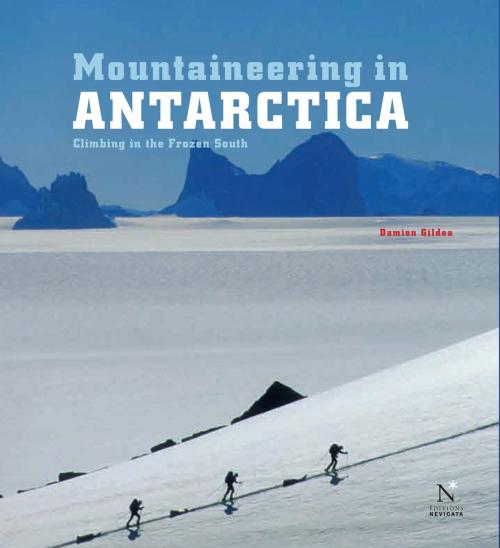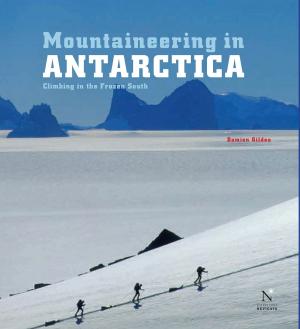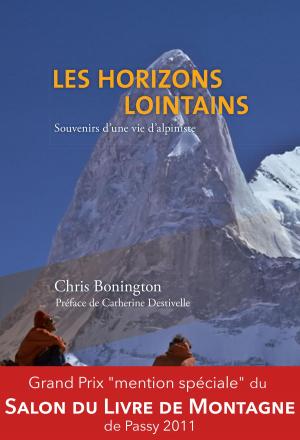Transantarctic Mountains - Mountaineering in Antarctica
Travel Guide
Nonfiction, Travel, Reference, Europe| Author: | Damien Gildea | ISBN: | 9782511031384 |
| Publisher: | Nevicata | Publication: | March 4, 2015 |
| Imprint: | Nevicata | Language: | English |
| Author: | Damien Gildea |
| ISBN: | 9782511031384 |
| Publisher: | Nevicata |
| Publication: | March 4, 2015 |
| Imprint: | Nevicata |
| Language: | English |
A beautiful work dedicated to mountain addicts and to amateurs who like to travel far from home!
Climbing Antarctica is a unique experience. It is a dream that only few mountaineers have had the privilege to fulfill and that you can now skim, thanks to this very nice book, richly illustrated and remarkably documented.
Damien Gildea will let you get be dragged into the rich history of Antarctica mountaineering adventure, from the first explorations in the 19th century until the achievements of today extreme climbers. He will lead you at the very heart of the most impressive and remote mountains of the South Pole…
Discovering the incredible Antarctica Mountains, emerging from the white hugeness, will let more than one reader speechless. It is hard to figure out that we are still on Earth !
In this volume you can find all the information about the Transantarctic Mountains.
This book is an absolute must-have for all climbers and travellers!
ABOUT THE AUTHOR
Damien Gidea is a polar mountaineer and explorer. He successfully led seven expeditions in the highest Antarctica Mountains, from 2001 to 2008. He is the author of the book entitled Antarctic Mountaineering Chronology, published in 1998, and of detailed topographical maps of the Livingston Island (2004) and Vinson Mountain (2006). His articles and photographs were published in many periodicals around the world, as the American Alpine Journal or the American magazine called Alpinist. He also led a skiing expedition to the South Pole and took part in several expeditions in the Himalayas, in Karakorum and in the Andes. When he is not exploring, Damien Gildea lives in Australia.
EXCERPT
The Transantarctic Mountains stretch over 3500 km across the continent and divide it into East and West Antarctica. Consisting of many smaller ranges and mountains, the Transantarctics contain some of Antarctica’s highest mountains and potentially some of its most difficult climbing. Vinson’s stream of Seven Summits climbers provide the financial base for the logistical operation into the Sentinel Range. Without such a desirable commodity, however, the Transantarctics have no such customers and hence no established operation. It can be done, but it costs.
Nonetheless, the Transantarctics are certainly not ‘unexplored’, as government scientists and their support personnel from the New Zealand and US programs based at Ross Island have been working in many locations along the range for decades. A number of these scientific parties have travelled to, and within, the range by helicopter, enabling access to very remote locations and often the helicopters have been used to land high on the mountains themselves. Before the advent of helicopters, teams travelled into the nearby ranges by dogsled. As elsewhere on the continent, such work occasionally involves climbing and a number of peaks in the range have been ascended in the course of surveying, geological studies and other scientific work. In addition, the aircrew working in support of the science programs have reportedly made a number of ascents, but owing to the authorities’ attitude to such activity details of these climbs are scarce.
Climbing Antarctica is a unique experience. It is a dream that only few mountaineers have had the privilege to fulfill and that you can now skim, thanks to this very nice book, richly illustrated and remarkably documented.
Damien Gildea will let you get be dragged into the rich history of Antarctica mountaineering adventure, from the first explorations in the 19th century until the achievements of today extreme climbers. He will lead you at the very heart of the most impressive and remote mountains of the South Pole…
Discovering the incredible Antarctica Mountains, emerging from the white hugeness, will let more than one reader speechless. It is hard to figure out that we are still on Earth !
In this volume you can find all the information about the Transantarctic Mountains.
This book is an absolute must-have for all climbers and travellers!
ABOUT THE AUTHOR
Damien Gidea is a polar mountaineer and explorer. He successfully led seven expeditions in the highest Antarctica Mountains, from 2001 to 2008. He is the author of the book entitled Antarctic Mountaineering Chronology, published in 1998, and of detailed topographical maps of the Livingston Island (2004) and Vinson Mountain (2006). His articles and photographs were published in many periodicals around the world, as the American Alpine Journal or the American magazine called Alpinist. He also led a skiing expedition to the South Pole and took part in several expeditions in the Himalayas, in Karakorum and in the Andes. When he is not exploring, Damien Gildea lives in Australia.
EXCERPT
The Transantarctic Mountains stretch over 3500 km across the continent and divide it into East and West Antarctica. Consisting of many smaller ranges and mountains, the Transantarctics contain some of Antarctica’s highest mountains and potentially some of its most difficult climbing. Vinson’s stream of Seven Summits climbers provide the financial base for the logistical operation into the Sentinel Range. Without such a desirable commodity, however, the Transantarctics have no such customers and hence no established operation. It can be done, but it costs.
Nonetheless, the Transantarctics are certainly not ‘unexplored’, as government scientists and their support personnel from the New Zealand and US programs based at Ross Island have been working in many locations along the range for decades. A number of these scientific parties have travelled to, and within, the range by helicopter, enabling access to very remote locations and often the helicopters have been used to land high on the mountains themselves. Before the advent of helicopters, teams travelled into the nearby ranges by dogsled. As elsewhere on the continent, such work occasionally involves climbing and a number of peaks in the range have been ascended in the course of surveying, geological studies and other scientific work. In addition, the aircrew working in support of the science programs have reportedly made a number of ascents, but owing to the authorities’ attitude to such activity details of these climbs are scarce.
A beautiful work dedicated to mountain addicts and to amateurs who like to travel far from home!
Climbing Antarctica is a unique experience. It is a dream that only few mountaineers have had the privilege to fulfill and that you can now skim, thanks to this very nice book, richly illustrated and remarkably documented.
Damien Gildea will let you get be dragged into the rich history of Antarctica mountaineering adventure, from the first explorations in the 19th century until the achievements of today extreme climbers. He will lead you at the very heart of the most impressive and remote mountains of the South Pole…
Discovering the incredible Antarctica Mountains, emerging from the white hugeness, will let more than one reader speechless. It is hard to figure out that we are still on Earth !
In this volume you can find all the information about the Transantarctic Mountains.
This book is an absolute must-have for all climbers and travellers!
ABOUT THE AUTHOR
Damien Gidea is a polar mountaineer and explorer. He successfully led seven expeditions in the highest Antarctica Mountains, from 2001 to 2008. He is the author of the book entitled Antarctic Mountaineering Chronology, published in 1998, and of detailed topographical maps of the Livingston Island (2004) and Vinson Mountain (2006). His articles and photographs were published in many periodicals around the world, as the American Alpine Journal or the American magazine called Alpinist. He also led a skiing expedition to the South Pole and took part in several expeditions in the Himalayas, in Karakorum and in the Andes. When he is not exploring, Damien Gildea lives in Australia.
EXCERPT
The Transantarctic Mountains stretch over 3500 km across the continent and divide it into East and West Antarctica. Consisting of many smaller ranges and mountains, the Transantarctics contain some of Antarctica’s highest mountains and potentially some of its most difficult climbing. Vinson’s stream of Seven Summits climbers provide the financial base for the logistical operation into the Sentinel Range. Without such a desirable commodity, however, the Transantarctics have no such customers and hence no established operation. It can be done, but it costs.
Nonetheless, the Transantarctics are certainly not ‘unexplored’, as government scientists and their support personnel from the New Zealand and US programs based at Ross Island have been working in many locations along the range for decades. A number of these scientific parties have travelled to, and within, the range by helicopter, enabling access to very remote locations and often the helicopters have been used to land high on the mountains themselves. Before the advent of helicopters, teams travelled into the nearby ranges by dogsled. As elsewhere on the continent, such work occasionally involves climbing and a number of peaks in the range have been ascended in the course of surveying, geological studies and other scientific work. In addition, the aircrew working in support of the science programs have reportedly made a number of ascents, but owing to the authorities’ attitude to such activity details of these climbs are scarce.
Climbing Antarctica is a unique experience. It is a dream that only few mountaineers have had the privilege to fulfill and that you can now skim, thanks to this very nice book, richly illustrated and remarkably documented.
Damien Gildea will let you get be dragged into the rich history of Antarctica mountaineering adventure, from the first explorations in the 19th century until the achievements of today extreme climbers. He will lead you at the very heart of the most impressive and remote mountains of the South Pole…
Discovering the incredible Antarctica Mountains, emerging from the white hugeness, will let more than one reader speechless. It is hard to figure out that we are still on Earth !
In this volume you can find all the information about the Transantarctic Mountains.
This book is an absolute must-have for all climbers and travellers!
ABOUT THE AUTHOR
Damien Gidea is a polar mountaineer and explorer. He successfully led seven expeditions in the highest Antarctica Mountains, from 2001 to 2008. He is the author of the book entitled Antarctic Mountaineering Chronology, published in 1998, and of detailed topographical maps of the Livingston Island (2004) and Vinson Mountain (2006). His articles and photographs were published in many periodicals around the world, as the American Alpine Journal or the American magazine called Alpinist. He also led a skiing expedition to the South Pole and took part in several expeditions in the Himalayas, in Karakorum and in the Andes. When he is not exploring, Damien Gildea lives in Australia.
EXCERPT
The Transantarctic Mountains stretch over 3500 km across the continent and divide it into East and West Antarctica. Consisting of many smaller ranges and mountains, the Transantarctics contain some of Antarctica’s highest mountains and potentially some of its most difficult climbing. Vinson’s stream of Seven Summits climbers provide the financial base for the logistical operation into the Sentinel Range. Without such a desirable commodity, however, the Transantarctics have no such customers and hence no established operation. It can be done, but it costs.
Nonetheless, the Transantarctics are certainly not ‘unexplored’, as government scientists and their support personnel from the New Zealand and US programs based at Ross Island have been working in many locations along the range for decades. A number of these scientific parties have travelled to, and within, the range by helicopter, enabling access to very remote locations and often the helicopters have been used to land high on the mountains themselves. Before the advent of helicopters, teams travelled into the nearby ranges by dogsled. As elsewhere on the continent, such work occasionally involves climbing and a number of peaks in the range have been ascended in the course of surveying, geological studies and other scientific work. In addition, the aircrew working in support of the science programs have reportedly made a number of ascents, but owing to the authorities’ attitude to such activity details of these climbs are scarce.















